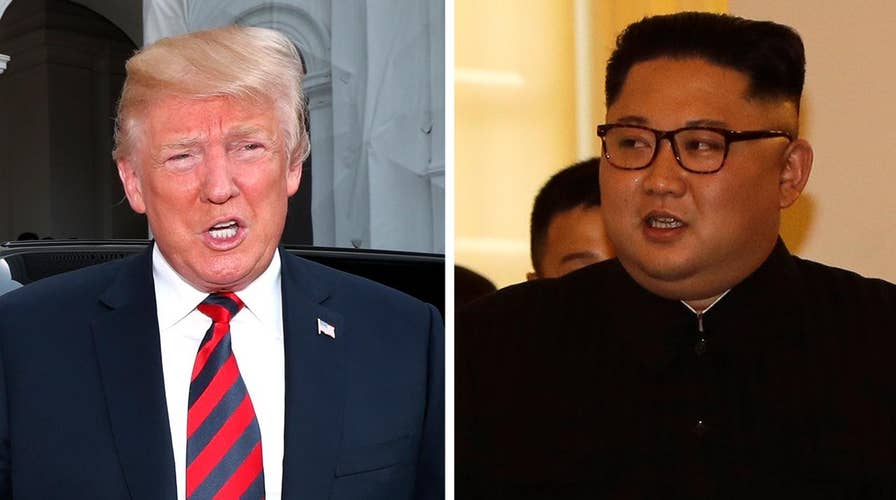Will an agreement come out of the North Korea summit?
Foreign policy experts offer insight on 'Fox & Friends' ahead of high-level talks between President Trump and Kim Jong Un.
President Trump and North Korean leader Kim Jong Un have arrived in Singapore and the city is abuzz with activity in anticipation of the first-ever meeting between a sitting U.S. president and a North Korean leader. What has to be accomplished in order for the meeting to be considered a success?
For years, North Korea has requested senior level meetings with the U.S., wanting desperately to establish diplomatic relations with Washington and reduce the U.S.-led maximum pressure economic sanctions regime. It has now gotten its wish, and President Trump has made it clear there is a path for North Korea to achieve great economic success in return for denuclearizing the Korean peninsula.
But as he prepares to meet President Trump, Kim no doubt has at least two key historical lessons at the forefront of his calculus.
First, Kim needs economic reform to survive, yet such reform comes – as the denouement of the Cold War and so-called “Arab Spring” have shown – with the risk of a loss of political control and the potential for complete regime collapse. The slightest crack in a ruthless totalitarian dictatorship’s control – enforced in this case through Soviet-style gulags and massive repression – and people lose their fear of protest and revolt.
Yet North Korea’s economy is in free-fall, relying on massive state-run corruption schemes, narcotics trafficking and counterfeiting operations to survive despite having significant reserves of coal, iron ore, zinc, limestone, minerals, and a well-educated yet cheap labor force at its disposal. Kim needs our help.
Second, Kim is wary of eliminating the nuclear deterrent, which made autocrats Saddam Hussein and Muammar Gaddafi vulnerable to regime change.
So President Trump might be asking his negotiating team how the U.S. might address these concerns.
We should be on the lookout for interim steps and agreements designed to build mutual trust and set the stage for solving the more challenging, contentious issues. President Trump, for instance, might discuss negotiating a treaty to end the Korean War.
He might ask how likely it might be that North Korea pursued an ICBM capability and nuclear weapons capable of striking the U.S. homeland to accumulate bargaining chips for negotiation.
He might ask whether Kim truly is interested in eliminating North Korea’s nuclear weapons in return for food, energy assistance, and fruitful economic relationships with the world community – or simply stringing us along to buy time, as he has in the past?
He might ask whether Pyongyang is willing to make regime-saving economic and political reforms?
And he most certainly should ask how the international community would ultimately deal with North Korea’s human rights abuses, which arguably make Kim and his coterie subject to prosecution for crimes against humanity?
In a best-case scenario, this summit – and those questions – will mark the beginning of a series of follow-on negotiations and summits, with diplomatic working groups focused on key issues. We should be on the lookout for interim steps and agreements designed to build mutual trust and set the stage for solving the more challenging, contentious issues.
President Trump might discuss negotiating a treaty to end the Korean War. Negotiations over North Korea’s ICBM capability might include a testing ban designed to prevent additional technological advances, and potentially the elimination of missile stocks. The U.S. and North Korea also might consider opening interest sections in each other’s capital cities to provide a more structured framework for bilateral engagement.
With so much that is unknown heading into the summit, what is certain is that the U.S. relationship with North Korea will embark on a new and unprecedented course when President Trump sits down for his first meeting with Kim. Based on two meetings in Pyongyang, Secretary Pompeo has already established a working relationship with the North Korean dictator.
What the world will be watching for is whether President Trump can build a productive relationship with Kim necessary for the follow-on negotiations and agreements on which our national security so deeply relies.

